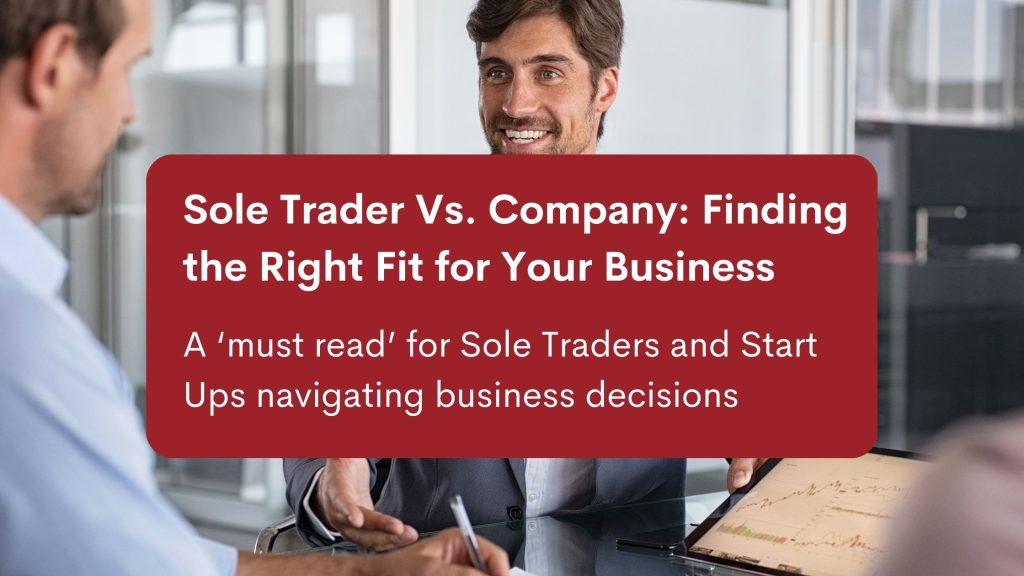Discover the optimum structure for your business now and into the future
Since our inception in 1911, we have been helping Irish entrepreneurs and business leaders navigate the complexities of accountancy, audit, taxation, business structuring, and strategies for growth. In this short read, we share our knowledge and experience gained over a hundred-plus years to help you demystify the ‘sole trader v’s company’ decision. We’ll also equip you with the knowledge you need to recognise the right moment to transition to a company structure in the future, should starting as a sole trader be the optimal choice for you today.
Understanding Your Business Structure Options
The choice between being a Sole Trader and forming a Limited Company in Ireland is more than just a legal formality; it’s a decision that impacts your tax obligations, business costs, personal liability, expense management, and more.
When weighing the options between operating as a Sole Trader or establishing a Limited Company, several key factors come into play. Operating as a sole trader is simple. The process of setting up and winding down a sole trader business is straightforward, with minimal legal and financial paperwork required. The simplicity of the structure heightens its appeal, however, it is not always the best option. Income tax rates as a sole trader can reach up to 55%, and there are fewer avenues for tax planning and securing business finance. On the other hand, opting for a Limited Company structure offers distinct advantages such as profits being taxed at a more favourable corporate rate of 12.5%, the creation of a separate legal entity that provides limited liability protection, and enhanced access to tax reliefs and financial credibility. Yet, a company structure comes with its own set of challenges, including more complex regulatory and filing obligations, public access to your financial accounts, and higher initial setup and ongoing operational costs. Each business owner must carefully consider these aspects to determine the best structure for their business goals and needs.
Let’s break it down:
Income and Taxation
As a Sole Trader, your income, after deductions, is subject to personal income tax rates. This can significantly impact your take-home pay, especially as your business grows. On the flip side, a Limited Company is taxed at the standard corporation tax rate (currently 12.5% in Ireland), significantly less.
Professional Fees
For sole traders, there is no legal obligation to hire an accountant or auditor to complete year-end accounts, although year-end Revenue tax returns and VAT (once applicable) are of course required. On the flip side, companies that do not obtain an audit exemption (described here) are legally obliged to conduct an audit through a registered auditor and whilst it is not legally required, it would be typical to hire an accountant to manage the complexities of company accounts.
Growth Prospects
Starting as either entity might appear similar initially, with modest invoicing and operational complexities. However, as your business scales, the administrative demands and growth potential diverge. A Limited Company offers a structured framework for expansion, branding, and succession planning, albeit with increased compliance and bookkeeping responsibilities. A sole trader structure on the other hand is often heavily reliant on the entrepreneur’s skills and knowledge, limiting scalability.
Personal Liability and Compliance
An important factor in deciding between a sole trader and company structure is personal liability. This is particularly important in the context of a business that is interacting with the general public. Sole Traders can risk personal asset ownership for business debts, whereas Limited Companies provide a layer of protection between the business owner and company, protecting personal assets from business liabilities.
Making Your Choice
Ask yourself a few critical questions when deciding:
- How do you view personal liability and risk?
- Do you think this business can scale quickly?
- Are you dealing with the general public?
- Are you prepared to deal with the administrative and reporting complexities of a limited company and do you have the budget for same?
- Which structure is preferential for your tax status today? Note, that you can transition to a company at a later stage.
We’re here to help
Whether you’re just starting as a Sole Trader or thinking about taking the plunge into becoming a Limited Company, our expert team at Ormsby & Rhodes is here to help. We can assist you in figuring out what’s best for your business, with advice that’s tailored to you and your financial goals. If you decide it’s time to make the transition to a company, we’ll be right there with you, guiding you through every step and making sure the transition is as smooth as possible. So, what are you waiting for? Get in touch with our experts today and let’s position your business for optimum growth! Email info@ormsby-rhodes.ie to arrange a consultation.





